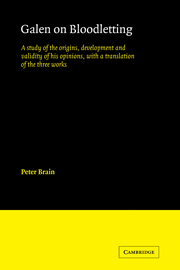 Galen on Bloodletting
Galen on Bloodletting Book contents
- Frontmatter
- Contents
- Preface
- Note on abbreviations and references
- Note on manuscripts and editions
- 1 Galen and his system: an introduction
- 2 Galen's Book on Venesection against Erasistratus (translation)
- 3 Galen's Book on Venesection against the Erasistrateans in Rome (translation)
- 4 Galen's Book on Treatment by Venesection (translation)
- 5 Development of Galen's views and methods as shown in the three works
- 6 Galen, venesection and the Hippocratic Corpus
- 7 Galen's practice of venesection
- 8 Galen's revulsive treatment and vascular anatomy
- 9 The testimony of other writers and the validity of Galen's opinions on sites for venesection
- 10 Galen's use of venesection as an evacuant: can it be justified? A medical digression
- 11 Conclusion
- Glossary
- Works cited
- Index
5 - Development of Galen's views and methods as shown in the three works
Published online by Cambridge University Press: 04 August 2010
- Frontmatter
- Contents
- Preface
- Note on abbreviations and references
- Note on manuscripts and editions
- 1 Galen and his system: an introduction
- 2 Galen's Book on Venesection against Erasistratus (translation)
- 3 Galen's Book on Venesection against the Erasistrateans in Rome (translation)
- 4 Galen's Book on Treatment by Venesection (translation)
- 5 Development of Galen's views and methods as shown in the three works
- 6 Galen, venesection and the Hippocratic Corpus
- 7 Galen's practice of venesection
- 8 Galen's revulsive treatment and vascular anatomy
- 9 The testimony of other writers and the validity of Galen's opinions on sites for venesection
- 10 Galen's use of venesection as an evacuant: can it be justified? A medical digression
- 11 Conclusion
- Glossary
- Works cited
- Index
Summary
The dating of the three works will be considered later, but it is clear that the first work, the De Venae Sectione adversus Erasistratum, was composed soon after Galen's first arrival in Rome; it is representative, therefore, of his youthful opinions. There is nothing in this work to suggest that Galen, at that stage of his life, considered using any evacuant remedy other than phlebotomy at the onset of the patient's illness. He agrees with Erasistratus that it is necessary to empty the plethos; the only question is by what means it should be evacuated. ‘I have always thought that once evacuation has been agreed on, the easiest and most prompt remedy is to open a vein, since in this way the inflammatory matters, and these alone, are evacuated as quickly as possible.’ All patients with plethos, he says, are most quickly and effectively treated by opening the veins; although Galen mentions alternative remedies used by Erasistratus, there is no indication that he uses any of them himself in these circumstances. Not only the physicians of the rationalist sect, but also the empiricists, all use venesection; even Asclepiades, who condemned all the dogmas of his predecessors and described the Hippocratic methods as an exercise in death. It is in use in most diseases and the most acute, and Hippocrates himself, ‘whom we regard as the leader of all the distinguished men in the profession, and the other men of old clearly did use it’. The ancients, in Galen's opinion, thought it nothing less than the most effective of all remedies.
Information
- Type
- Chapter
- Information
- Galen on BloodlettingA Study of the Origins, Development and Validity of his Opinions, with a Translation of the Three Works, pp. 100 - 111Publisher: Cambridge University PressPrint publication year: 1986